
NH Hotel Group is a company committed to the wellbeing of its guests and efficient management
of the available resources in the environment where the Group’s hotels are located. The Company is
aware of the effects of its activity on the environment, and works to prevent and anticipate possible
environmental contingencies, as well as to integrate sustainability in all its processes, striving to
reduce its impacts.
The Company’s environmental management strategy is articulated through NH ROOM4 Planet, which defines the roadmap for compliance with the commitments undertaken in relation to the fight against climate change and progress towards decarbonization, efficient management and responsible consumption of resources and circular economy, the development of more sustainable products, but also the involvement of employees, suppliers, partners and customers as key players in attaining these goals.
To formalize the extension of these commitments to the entire operation and the decision-making process of NH Hotel Group, on July 29th, 2020, the Board of Directors approved the new Environment and Energy Policy. This update includes both the supply chain and distribution, the inclusion of new partners or the acquisition of hotels in the portfolio and the operation of hotels under ownership, lease, management and franchise arrangements to comply with this Policy, commitments to which NH has signed up voluntarily, or the applicable environmental laws and regulations.
To manage the environmental strategy, NH Hotel Group has a Corporate Environment Department which reports to the Vice President of Engineering, Maintenance and Environment. Furthermore, with the aim of preventing and reducing environmental risks and impacts, teams from different areas at corporate, business unit and hotel level work in coordination.
Additionally, coinciding with the launch of the new Environment and Energy Policy, in the last quarter of the year a new online course was launched to raise awareness and train employees on environmental aspects and provide them with the skills required to incorporate them in their daily routines and tasks and thus share in attaining the Company’s goals.

The Company’s environmental management is based on the identification and annual review of the main environmental impacts it could cause through the environmental risk map. Although there is a specific process for assessing environmental risks, the methodology followed is consistent with that of the corporate risk management model. In 2020, the risks that have been identified as the most significant are those deriving from climate change, water shortage and the consequences of new European legislation on single-use plastics and the non-inclusion of new technologies for a low-carbon economy. Atmospheric pollution, including noise and light pollution, the consumption of raw materials and the protection of biodiversity were not significant to our business after this analysis.
The updated environmental risk map is reviewed and validated by the Internal Audit Team and the VP of Maintenance, Engineering and Environment, who reports directly to the Chief Operations Officer, who in turn is a member of the Risk Committee.
As far as provisions and guarantees to cover environmental risks are concerned, NH Hotel Group makes investments in environmental activities that are valued at acquisition cost and capitalized as a higher cost of property, plant and equipment or inventories in the year in which they are incurred.
Expenses deriving from the protection and improvement of the environment are charged to the income statement in the year they are incurred in, independently of when the related monetary or financial flow takes place.
In turn, provisions for likely or certain liabilities, ongoing lawsuits and damages, or outstanding obligations for an indeterminate amount related to the environment and not covered by the Company’s insurance policies are recorded at the outset of the liability or obligation that determines possible damages or payments.
In 2020, NH Hotel Group has not received any significant fine for environmental breaches imposed by the competent administrations in each region where it operates.
ENVIRONMENTAL CERTIFICATION PROGRAMME
NH Hotel Group hotels have an ISO 14001 environmental management system and the ISO 50001 energy efficiency system certified for accommodation, restaurants, meetings and events services. At the end of 2020, 47.4% of the hotels in Germany, Spain and Italy hold certifications in ISO 14001 – a total of 100 hotels – or ISO 50001 – 30 hotels.
In addition to the ISO certification, there are some hotels that also have other environmental certifications such as BREEAM, LEED, Green Key, Hoteles+Verdes. The aim is to have an increasingly significant volume of hotels with globally recognized environmental certifications, specific to the tourism sector, and approved by the Global Sustainable Tourism Council, the world’s leading body.
In 2020, 10 hotels obtained a sustainability recognition for the first time, bringing the total number of certified hotels3 to 157 out of 361 hotels in the portfolio. It should be noted that 7 hotels belonging to the Southern Europe Business Unit have obtained ISO certification.
3 Some NH Hotel Group hotels have several certifications, so the final figures correspond only to the number of hotels. The scope is all hotels in the portfolio.
“NH Hotel Group has individual
certification for 44%
of the hotels in its portfolio”
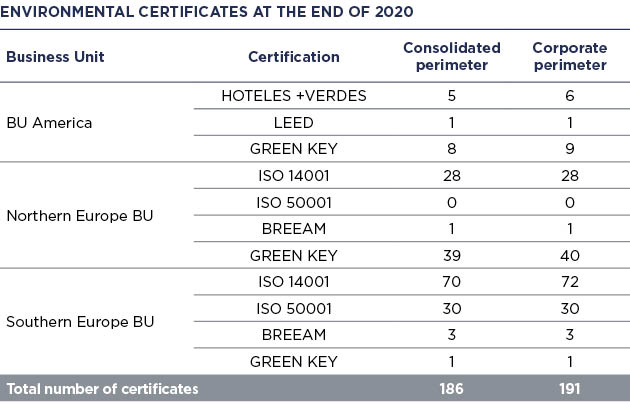
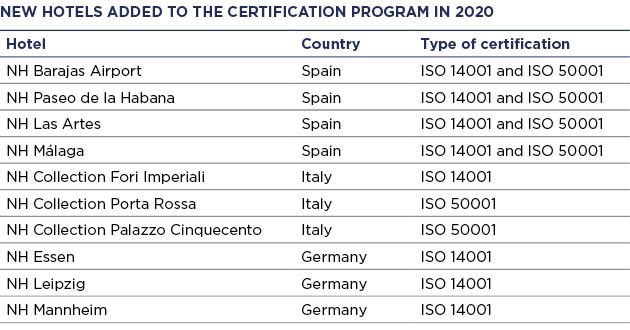

COMMITMENT TO THE FIGHT AGAINST CLIMATE CHANGE AND PROGRESS TOWARDS DECARBONIZATION
For NH Hotel Group, the fight against climate change is a fundamental strategic value. This is why, in 2019, the Company became the first Spanish hotel company to set carbon emission reduction targets that have been scientifically validated by the Science Based Targets initiative (SBTi) – the leading alliance and driving force in the business sector in the fight against climate change, with the participation of CDP, the UN Global Compact, World Resources Institute and World Wide Fund for Nature.
In this way, NH Hotel Group has formalised its commitment to reduce carbon emissions throughout its value chain by 20% by 2030, thus avoiding the emission of 70,000 metric tons of CO2 into the atmosphere. Setting this target marks out NH Hotel Group’s roadmap towards a significant reduction in the carbon footprint of its activity in the coming years, aligned with the goal set out in the Paris Agreement to limit the increase in global temperature to less than 2ºC, and join the efforts being made globally towards the transition to a low-carbon economy.
The Chief Operations Officer is responsible for environmental and climate aspects in the Management Committee and is the person who validates the Company’s climate strategy in the NH ROOM4 Sustainable Business model. COO was appointed as an executive member of the Board of Directors.
With effect from October 2nd, 2020, he is also an executive member of the Board of Directors.
The Board of Directors of NH Hotel Group has responsibility for supervising the NH ROOM4 Sustainable Business model, which is one of the Company’s strategic pillars. This supervision and control task is carried out through two of the Committees of the Board of Directors. On one hand, the Nominations, Remuneration and Corporate Governance Committee is responsible for monitoring and overseeing compliance with the model and the Corporate Responsibility Policy of NH Hotel Group. On the other hand, the Audit and Control Committee is responsible for evaluating any matter relating to risks, including environmental and climate risks.
Climate risks and opportunities
Since 2019, NH Hotel Group has managed the risks deriving from Climate Change as part of the risk management model, as Climate Change has been identified as one of the Company’s emerging risks.
Alongside this, every year the climate risks the Company is exposed to are analysed as part of the environmental risk map updating process, following the methodology aligned with the corporate risk management model (see section on Risk Management).
In the most recent update of the environmental risk map, in January 2021, regulatory developments such as the EU Green Deal, exposure to extreme weather events and natural disasters, water scarcity and the non-inclusion of new technologies towards a low-carbon economy, have been identified as the most significant climate change risks.
This regulatory environment towards a modern economy, efficient in the use of resources and competitive and neutral in carbon emissions, will have an impact for NH Hotel Group both in terms of investment and renovation of hotels, or acquisition of new establishments. We must remember that 83% of NH’s portfolio is in European cities.
Furthermore, the change in weather patterns has a direct effect on heating and cooling systems, leading to additional costs related to the operation and maintenance of buildings, as well as other costs such as insulation, ceilings and maintenance of building exteriors.
The constant analysis of the climate risks to which we may be subjected allows us to be alert and turn them into an opportunity for the Company. Since 2008, we have been able to optimise operating processes and obtain savings through reductions in energy an water consumption of more than 31 million euros.
These actions and commitments help to position NH Hotel Group as a sustainable organisation that respects the environment, thus increasing the value of its brands.
Mitigation and adaptation measures
As a first step to reduce the carbon footprint deriving from the operations of its hotels, the Company has a corporate standard, the “Eco-Efficient Hotel Guide”, to integrate sustainability and energy efficiency in the design and construction of new hotels and renovations. This standard guarantees that all the activities of its buildings will take environmental guidelines and climate change risks into account in the design and construction in order to minimise and control risks.
As well as reinforcing the work the Company has been doing for years in terms of efficiency (Energy Efficiency Plan), in order to meet its SBT target of reducing its carbon emission by 20% throughout its value chain by 2030, the Company is working along three other lines:

• An exhaustive analysis of the opportunities to continue working with suppliers and together reduce the carbon footprint. In 2019 and 2020, the suppliers with the largest carbon footprint have been identified and we will work with them to improve reporting channels and to seek alignment to reduce emissions in the value chain.
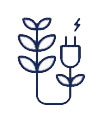
• An exhaustive analysis of the opportunities to continue working with suppliers and together reduce the carbon footprint. In 2019 and 2020, the suppliers with the largest carbon footprint have been identified and we will work with them to improve reporting channels and to seek alignment to reduce emissions in the value chain.
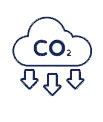
• An exhaustive analysis of the opportunities to continue working with suppliers and together reduce the carbon footprint. In 2019 and 2020, the suppliers with the largest carbon footprint have been identified and we will work with them to improve reporting channels and to seek alignment to reduce emissions in the value chain.
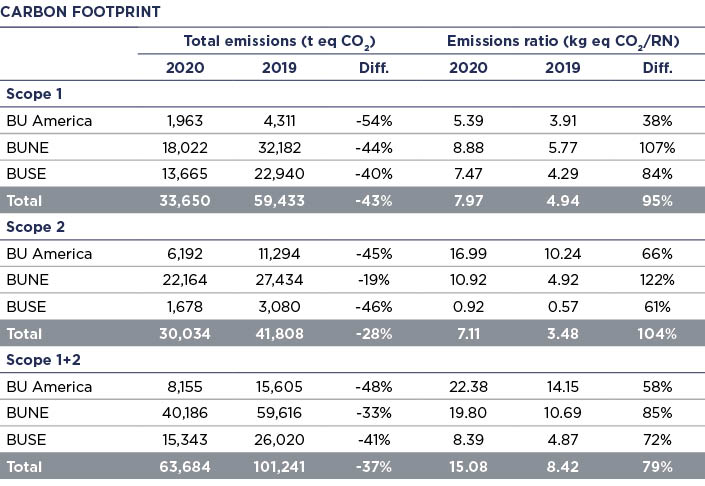
Following the approval of the emission reduction targets validated by SBTi, NH Hotel Group has estimated, following this methodology, a total scope 3 emissions of 162,752 t eq CO2 in 2020.
The exceptional and irregular operating conditions of the hotels since March and throughout the rest of the year are reflected in NH Hotel Group’s carbon footprint data. Absolute emissions decrease in all scopes due to the decrease in activity, and consequently in consumption, however the emissions ratio increases due to the drastic decrease in occupancy (RN).
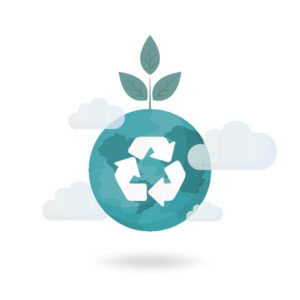 The Company also participates in different forums and projects to promote the fight against climate change and the reduction of carbon emissions and consumption.
The Company also participates in different forums and projects to promote the fight against climate change and the reduction of carbon emissions and consumption.
4 The published scope 3 emissions do not fall within the scope of the audit.
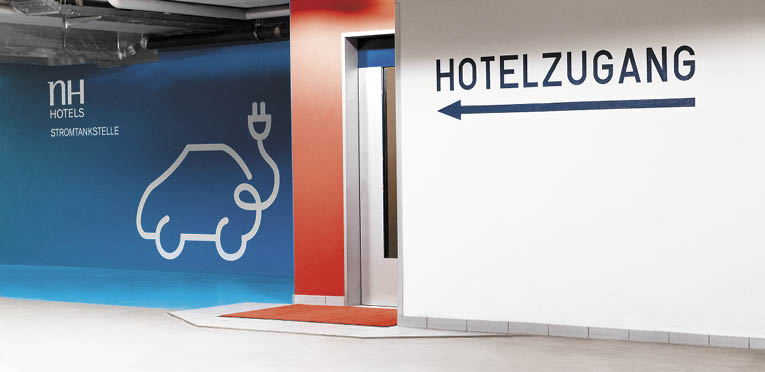
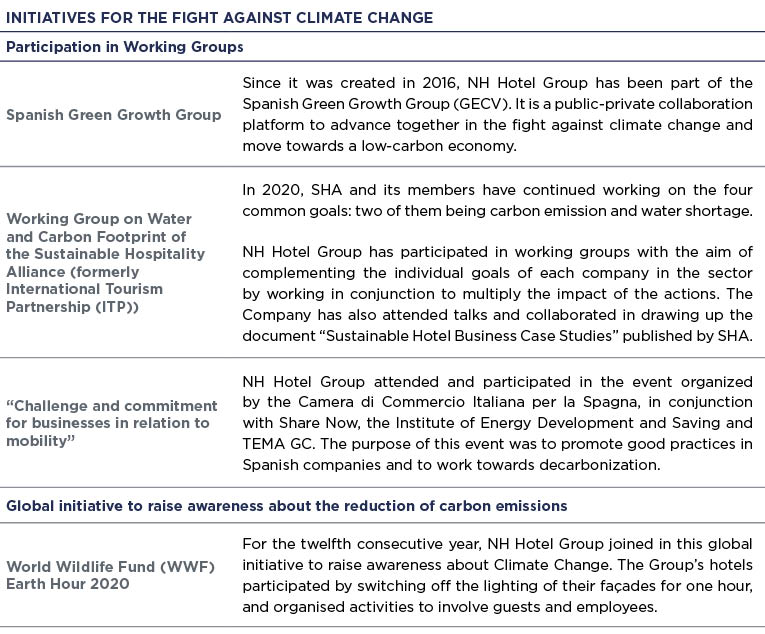
EFFICIENT MANAGEMENT AND RESPONSIBLE CONSUMPTION OF RESOURCES

GREEN SAVINGS PROJECT
A project focused on both obtaining savings in the
Company’s operating costs and on energy efficiency,
to ensure savings in resources: water, energy and other
expenses.
To keep exhaustive and rigorous control of the energy consumption, carbon footprint and water consumption measures, NH Hotel Group uses the Sustain Focus platform, from which the sustainability strategy indicators are monitored. This is an online system to which almost all the Company’s hotels have access and which permits reporting, control, monitoring and traceability of the indicators as well as of water and energy consumption and costs.
Energy Efficiency Plan
This plan groups together “energy efficiency” projects, considering all those that can improve energy consumption in the hotels, as well as the associated costs:
• Changes in equipment, where the replacement involves greater efficiency: light bulbs, minibars, washing equipment, heating and air-conditioning, boilers, coolers…
• Investments related to control of installations: building energy management systems, update of metres, improvements in lighting…
• Actions on façades that represent improvements in the building envelope and in insulation.
• Additionally, in 2019 the Company created a new CAPEX line intended for projects where the goal is not just the economic return but knowing the environmental return. Some of these projects are elimination of fossil fuels and increase in renewable energy. Due to the Contingency Plan drawn up because of COVID-19, most of the projects had to be cancelled.
As a result, energy efficiency improvement projects worth 3 million euros were implemented in 2020.
In addition, in 2020 NH Hotel Group has worked on updating the “Eco-Efficient Hotel Guide”, with the aim of supporting sustainable growth and reducing the carbon emissions generated by the construction and design of the Company’s hotels. This Guide will be applicable to all the brands under which NH Hotel Group operates.
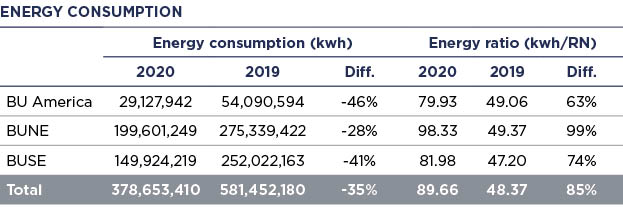
Due to the difficulties caused by the pandemic, which caused unprecedented situations for the hotels (temporal or prolonged closings, staff reductions and drastic occupancy drops), together with the limitations caused by the confinement of the hotel’s technicians and the distribution companies, the consumption data management has been more complicated than usual. This has led the company into making an estimate for the specific months in which data were not available, in order to have the most realistic image of the indicator.
In the specific case of energy, an estimation for monthly gas and electricity data of the consolidated hotels was carried out of 3.5% and 3 % respectively. To achieve this, consumption has been weighted using the occupancy of 2019 and 2020 and considering comparable months (same climatic conditions, given that air conditioning is one of the factors that most influences energy consumption).
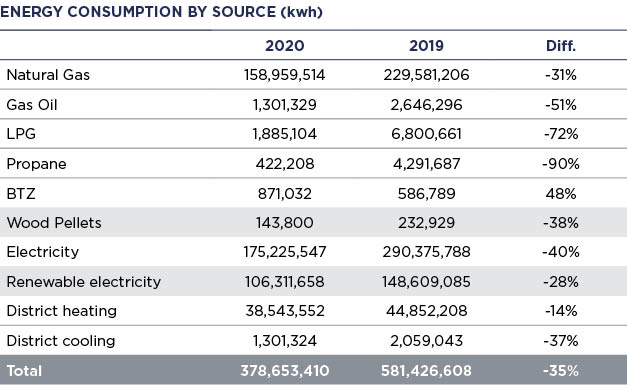
Water management
Since the first Sustainability Plan was defined in 2007, measures have been implemented to reduce water consumption such as the introduction of aerators and devices placed in cisterns, the installation of novel water recovery and reutilization systems, the efficient procurement of devices such as dish-washing equipment for kitchens, as well as employee training and awareness raising and the redesign of operating guidelines and actions in kitchen and housekeeping. In 2014, NH Hotel Group progressively started to install showers that reduce the volume of water by 40% thanks to their saving technology.
In 2020, the Company has gone a step further in the diagnosis of the impact of its activity with the identification, through the World Resources Institute’s Aqueduct tool, of hotels in its portfolio that are located in areas with a risk of water stress. The result of the analysis is that 29% of the hotels in NH Hotel Group’s portfolio are located in high water stress areas.
With this snapshot, the Company will work on defining a strategy for water management, with action plans that assure a model of responsible consumption of water resources.
Due to the difficulties caused by the pandemic, which caused unprecedented situations for the hotels (temporal or prolonged closings, staff reductions and drastic occupancy drops), together with the limitations caused by the confinement of the hotel’s technicians and the distribution companies, the consumption data management has been more complicated than usual. This has led the company into making an estimate for the specific months in which data were not available, in order to have the most realistic image of the indicator.
In the specific case of water, an estimate has been made for 4% of the consolidated hotels’ monthly water data. To achieve this, consumption has been proportionally calculated to the occupancy of 2019 and 2020.

The water consumption that was being reported by the market until last year, according to the definition of “GRI (2016)-303-1-Water withdrawal by source” (water withdrawn), corresponds this year with the information reported in the new water standard “GRI (2018)-303-3-Water withdrawal.
The water that enters the hotels for use in kitchens, cleaning, bathrooms, filling swimming pools, etc. is discharged into the municipal sewage networks. Water consumption attributable to losses that could be caused by evaporation in swimming pools or fountains, irrigation, or cistern tanks
and fire water is not significant.

WASTE MANAGEMENT AND CIRCULAR ECONOMY
NH Hotel Group has implemented a system of waste separation at the point of origin in all its hotels to permit and facilitate recycling. The types of waste separated are paper and cardboard, glass, used oil, packaging (plastic, cartons, tins, etc.), and organic. This system permits the recovery of material for recycling and subsequent valuation.
Hazardous waste is separated according to the legal requisites of each region. Withdrawn furniture and fittings that are in good condition during refurbishment processes may be given away to employees or donated to local organizations.
It should be noted that, in 2020, several of the Company’s hotels had started to coordinate a project with the aim of reducing the waste generated by the hotels and improving waste management. Due to COVID-19 and the closure of many hotels in our portfolio, this project was set aside, and is expected to resume as soon as the Company’s returns to normal operations.

Commitment to reduce single-use plastics
Although the consumption of raw materials is not an aspect that has been significant for NH Hotel Group in its analysis of environmental risks, European legislation on single-use plastic does have a relevant impact.
Accordingly, in 2018 the Company established a plan to eliminate disposable single-use plastic articles from its standards for all brands in the portfolio. In 2020, articles such as plastic cups in rooms, laundry bags, slipper packaging, and candy wrappers, among others, disappeared or were replaced with more sustainable alternatives.
In addition, the soap products offered in the bathrooms will be replaced with dispensers. The plan for the reduction of single-use plastics contemplates the introduction of drinking fountains in public areas, thus avoiding the use of plastic bottles.
NH Hotel Group has estimated that this eliminates 31 million single-use plastic articles in the Group’s hotels.
Although the Company’s policy is to eliminate single-use plastic articles, a target met in 2020 for plastics deriving from normal hotel operations, one of the cleaning and disinfection protocols implemented in the hotels with Feel Safe at NH was the mandatory requirement that all elements likely to be shared by guests (remote controls, amenities, blankets …) had to be covered with plastic to guarantee hygiene. This has meant that, exceptionally and due to the circumstances of the pandemic, that it has been necessary to obtain and manage 1.6 million plastic bags in the hotels in 2020.
In addition, the mandatory use of masks and handwashing measures has led to the purchase of 1.2 million masks, 1.3 million sanitary towels and more than 30,000 bottles of hydroalcoholic gel and their subsequent management.

CORK2CORK Project
This is a project that arose with the aim of promoting the circular economy and encouraging recycling, reuse and other types of recovery. This project is a pioneering sustainable initiative in the European hotel sector, which NH Hotel Group has developed together with the leading company in cork coverings and stoppers, Amorim.
The aim of the initiative is to recover and recycle the cork stoppers used in hotels to give them a new use by turning them into material for covering or insulation that can be used in the Group’s rooms and refurbishments. This insulating material reduces noise pollution and the need for artificial heating in the rooms, thus improving their energy efficiency. In Spain and Italy, 55 hotels participate in this initiative and collect cork stoppers.
In 2020, the Spanish Green Growth Group published “34 Green Economy Case Studies”, a compendium of best practices aligned to sustainable models and their contribution to competitiveness and the generation of value for the Companies that promote them and society. The CORK2CORK project was selected and published as one of the success cases.
In 2020, because of the health crisis and the decline in the hotels’ activity, there has been no opportunity to collect a significant quantity of cork stoppers.

Fight against food wastage
NH Hotel Group is aware that, due to food waste, not only are these resources lost, but also others associated with their production or transport. The origin of food wastage is generated in the process of preparing each of the F&B services.
To minimize the impact of wastage, the hotels apply processes, technical data sheets and preparation standards in the production chain. These are applied based on a forecast of needs (orders), preparation, conservation and turnover of all products, also guaranteeing the best quality.
In 2019, pilot projects were launched to analyse the waste generated in the kitchen, identifying what type of waste was thrown away, at what time, and how much, thus providing useful information to reduce food waste. During 2020 and due to the damage caused by the pandemic, NH Hotel Group is committed to supporting groups especially impacted by COVID-19 through the creation of a new process that increases efficiency in the management of resources and the use of surplus production in kitchens. To this end, it has begun to collaborate with various food start-ups that reuse these surpluses, providing an outlet for the product not consumed in the hotel.
The closure of hotels and reduction of staff during 2020 has forced us to halt these projects, which will restart as soon as activity has returned to normal.
DEVELOPMENT OF MORE SUSTAINABLE PRODUCTS

GREEN HOTEL PROJECT
This project seeks to offer value to customers through sustainable actions, focusing on the
innovative attributes that improve brand perception.
The most noteworthy examples of the project are the Eco-friendly Meeting and Events and the Sustainable Mobility services that NH Hotel Group offers in its hotels.
Eco-friendly meetings and events
The Group’s hotels seek to involve the client during the celebration of their events, offering the Eco-friendly Meetings & Events service and the carbon footprint calculation service for the events and meetings held. It also offers an emissions offsetting service in collaboration with Carbon Clear, a founding member of the International Carbon Reduction and Offset Alliance. The carbon footprint of the event is calculated through an internal procedure based on the GHG protocol and the “Guidelines for the preparation of the national inventory of greenhouse gas emissions” of the IPCC (Intergovernmental Panel on Climate Change). The calculation of the event’s carbon footprint includes transport and the use of meeting rooms as well as the rooms of the selected hotel.
Sustainable mobility
During customers’ stays and sightseeing trips, the Company offers mobility services such as carsharing or bicycle hire. Currently there are more than 26 hotels that offer bicycle hire services, as well as charging points for electric cars installed in 48 hotels. NH Hotel Group has had a global sustainable mobility standard since 2014.
In 2020, the Company has continued to offer electric mobility charging point services, increasing the number of hotels and offices that have this service. This year, a charging point for electric vehicles has been installed for employees of the Headquarters.
The charging points at hotels are currently being updated, improving the technology to offer faster charging adapted to new vehicles.
Customer satisfaction with sustainability
NH Hotel Group measures customer satisfaction with regard to sustainability.
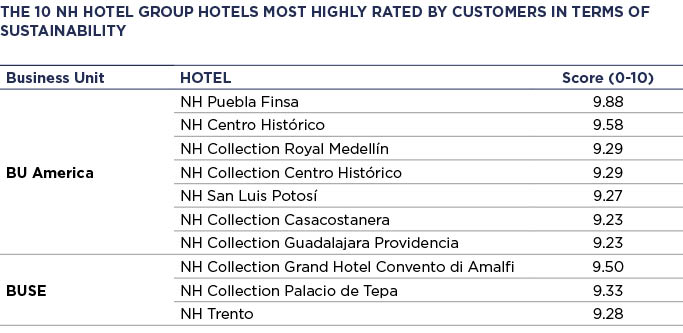
We would highlight that following the incorporation of the Tivoli hotels into the “Quality Focus” system, the following hotels have obtained a score of 10 in their first assessment: Tivoli Coimbra, Tivoli Évora Ecoresort, Tivoli Lagos and Tivoli Marina Portimão.

OTHER NOTABLE PROJECTS
SUSTAINABLE STAFF CANTEENS
Several of the Company’s hotels, wanting to create more sustainable spaces within their establishments, decided to implement sustainable staff canteens. This project consists of renovating the staff canteen to create a completely sustainable space, including criteria for choosing sustainable material. This space has been used to create awareness about climate change and sustainability among the hotel’s employees.
SUSTAINABLE FISHING
Although NH Hotel Group does not carry out its activity in any protected natural area, the Company has a number of different measures and initiatives in place to preserve and restore the biodiversity of the environments where it operates.
The Company’s hotels encourage sustainable fishing through legal compliance in respect of consumption of species and a responsible procurement of such products.
URBAN VEGETABLE GARDENS
Some NH Hotel Group hotels have space to install urban vegetable gardens. Growing plants in these spaces enhances the landscape and the gastronomic value of dishes. They also reduce the negative environmental impact by reducing the need to transport these products and they generate a sense of community among the employees.
In 2020, the NH Alonso Martinez (Spain) has worked on the GreenNH Roof project. This consists of incorporating an urban vegetable garden in the hotel located in the centre of Madrid, generating a sustainable green space. The garden is on the roof, which has the perfect space for the installation of seedbeds, growing trays or even a greenhouse. The GreenNH Roof is also open to any Company employee who works in Madrid.
The NH Collection Royal Medellín (Colombia) takes care of an ecological vegetable garden where aromatic herbs such as parsley, thyme, mint, rosemary, peppermint, basil, oregano, etc. are grown. These herbs, which are free from pesticides and have a high nutritional value, are used in the hotel kitchen. This hotel also cares for the green area around its hotel, favouring the habitat of numerous animal species, the reduction of noise and pollutants, and maintaining the passageway between natural areas. This green area is open to guests to enjoy.
The NH Collection Royal Hacienda in Bogotá (Colombia), also has a small vegetable garden in its garden area where aromatic plants are grown that are also used in the hotel’s kitchen.
In Italy, the NH Collection Piazza Carlina and the NH Milano Congress Center also have vegetable gardens with aromatic plants; and the NH Orio al Serio has another garden where lettuces and tomatoes are grown.
In turn, the NH Collection Grand Hotel Convento di Amalfi (Italy), has a garden in which aromatic herbs, vegetables and citrus fruits are grown to be used in the kitchen and in the cosmetics for the hotel’s spa (aloe vera and lavender). Customers can experience this garden through a trail, such as the meditation trail, which consists of visiting the five terraces it currently features: vegetable garden, rose terrace, monks’ walk, botanic terrace, and relaxation terrace.
HOTELS FOR BEES
Conscious of the limited space in cities for biodiversity, their importance in ecosystems and aware of the critical situation of bees in Europe, five of the Group’s hotels continue to provide a home for bees on their roofs in a way that is safe for guests. These hotels are: NH Wien City (Austria), NH Collection Wien Zentrum (Austria), NH Danube City (Austria), NH Vienna Airport (Austria), NH Berlin Alexanderplatz (Germany), NH Potsdam (Germany), NH Köln Altstadt (Germany), NH München Ost Conference Center (Germany).
CAGE-FREE EGGS
NH Hotel Group promotes animal welfare, prioritizing the use of eggs laid by free range hens. This initiative was implemented in hotels in northern Europe, which currently use free-range eggs in their preparations. Additionally, as part of MINT, the Company joins Minor Hotels in its commitment to procure all eggs consumed in its establishments from non-caged hens by the end of 2027.


